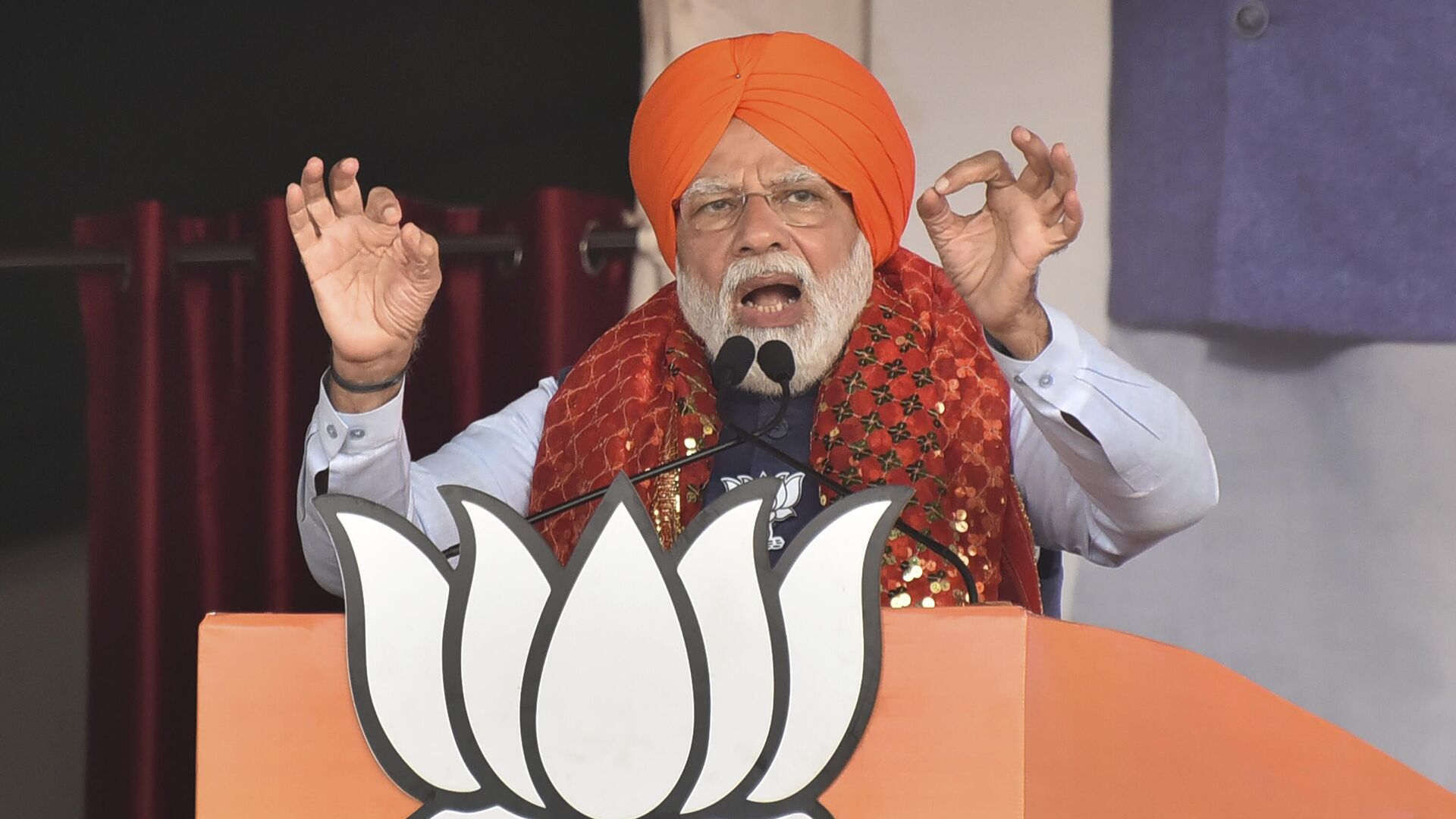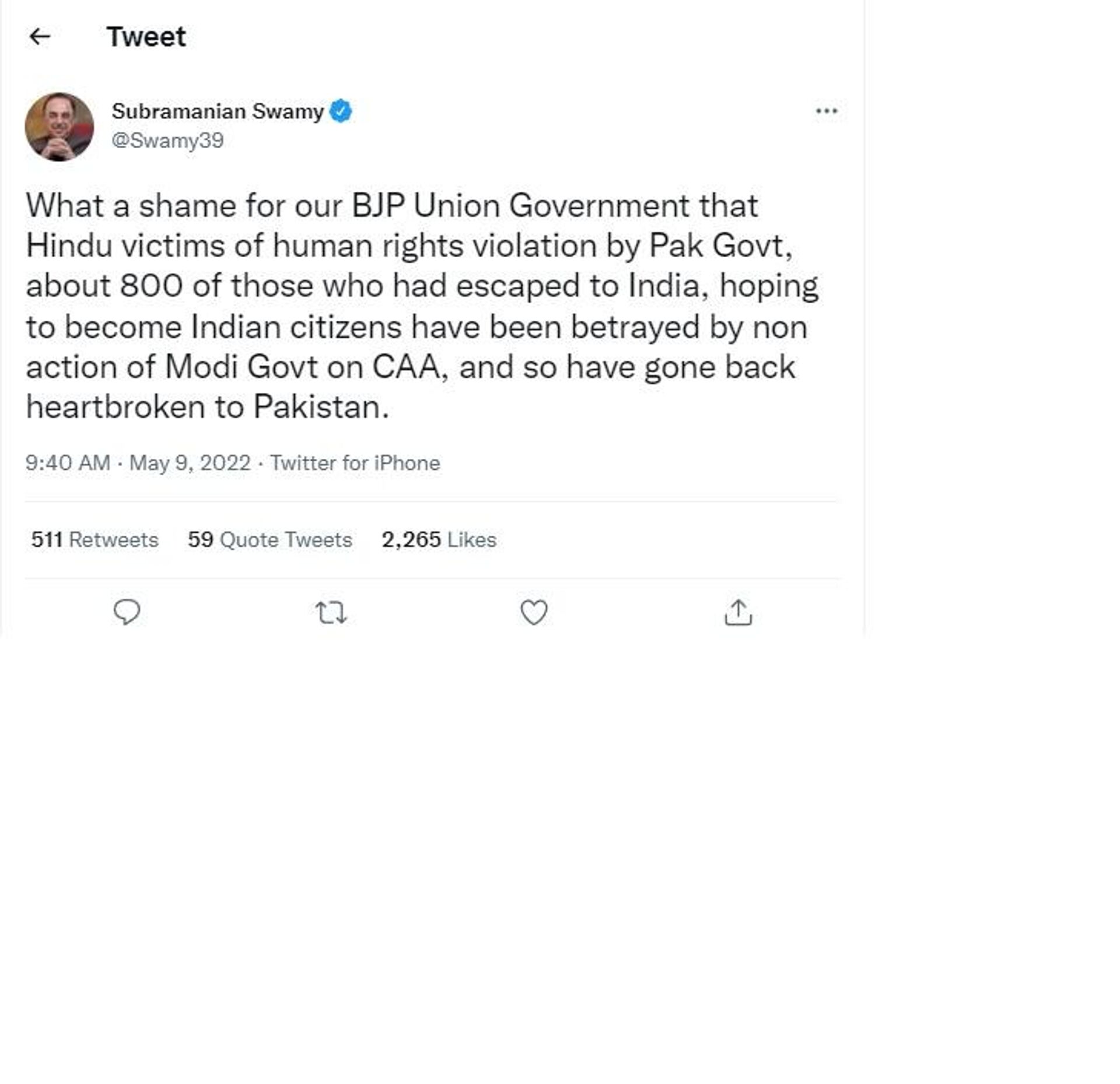https://sputnikglobe.com/20220509/betrayed-bjp-mp-slams-modi-govt-after-persecuted-pakistani-hindus-denied-indian-citizenship-1095356784.html
'Betrayed': BJP MP Slams Modi Gov't After 'Persecuted' Pakistani Hindus Denied Indian Citizenship
'Betrayed': BJP MP Slams Modi Gov't After 'Persecuted' Pakistani Hindus Denied Indian Citizenship
Sputnik International
New Delhi has for long been sympathetic to the incidents of alleged persecution of Hindu and other minorities in its neighbourhood. Prime Minister Narendra... 09.05.2022, Sputnik International
2022-05-09T08:44+0000
2022-05-09T08:44+0000
2022-12-08T18:02+0000
citizenship
amit shah
narendra modi
bharatiya janata party (bjp)
muslims
hindus
pakistan
https://cdn1.img.sputnikglobe.com/img/07e6/04/01/1094391692_0:196:3000:1884_1920x0_80_0_0_7d3b464858987f962a9da4baf3f16cc0.jpg
Subramanian Swamy, a senior lawmaker from Prime Minister Narendra Modi's Bharatiya Janata Party (BJP) has slammed the government over its inability to process citizenship applications of 800 Pakistani Hindus who had to return to the Islamic nation after New Delhi failed to process their applications.Seemant Lok Sangathan (SLS), an advocacy group in the Indian state of Rajasthan, has told The Hindu newspaper that the migrants were seeking Indian nationality on the basis of “religious persecution” in Pakistan.The online portal for processing Indian citizenship applications doesn’t support the uploading of the Pakistani passport, the newspaper reported. The Pakistani migrants are thus left with no option but to get their passports renewed at the Pakistani High Commission in New Delhi at a high financial cost.People’s Union for Civil Liberties (PUCL), India’s largest human rights’ organisation, has also blasted the government for the episode.The Rashtriya Swayamsevak Sangh (RSS), a socio-cultural organisation and the ideological parent of the federally ruling BJP, says that India has always “belonged to the Hindus” and it claims that Muslims and Christians were originally adherents of Hinduism.Since 2018, a total of 29 districts in several Indian states, including in Rajasthan, have been accorded the autonomy to accept online citizenship applications from non-Muslim minorities in Pakistan, Afghanistan and Bangladesh. The minorities include Hindus, Sikhs, Christians, Parsis, Jains and Buddhists.Granting citizenship otherwise is a federal subject governed by the Ministry of Home Affairs (MHA).Nityanand Rai, the Minister of State (MoS) for Home Affairs, informed the Parliament in December 2022 that India had granted citizenship to 3,117 applicants hailing from minority communities in Pakistan, Bangladesh and Afghanistan between 2018 and 2021.Rai informed that the citizenship applications were governed by the provisions in The Foreigners Act (1946), The Registration of Foreigners Act (1939), The Passport (Entry into India) Act (1920) and The Citizenship Act (1955).The minister said in another written statement in the Parliament back in March 2020 that of the 18,999 aliens granted Indian citizenship between 2014 and 2019.A total of 2,935 Pakistani nationals were granted Indian passports during the period, he said.Another legislation, the Citizenship Amendment Act (CAA), was passed in the Parliament in 2019 but is yet to kick in. The CAA aims to fast-track citizenship applications for persecuted minorities from Pakistan, Afghanistan and Bangladesh.However, the passage of the CAA sparked countrywide protests in the country, particularly from the Indian Muslim community, who have protested the legislation for excluding Muslims from being eligible for Indian citizenship under the new law. Some Muslim groups have also expressed concerns that the legislation could be used to strip them of their Indian citizenship, a charge Prime Minister Modi’s government has repeatedly rejected.A statement from the Home Minister Amit Shah on 2 February last year said that the rules governing the CAA were yet to be formed as of then. As of today, no foreigner has been granted citizenship under the CAA.Home Minister Shah said at a public meeting last week that the CAA would come into force once the COVID situation in the country eases further.
pakistan
Sputnik International
feedback@sputniknews.com
+74956456601
MIA „Rossiya Segodnya“
2022
News
en_EN
Sputnik International
feedback@sputniknews.com
+74956456601
MIA „Rossiya Segodnya“
Sputnik International
feedback@sputniknews.com
+74956456601
MIA „Rossiya Segodnya“
citizenship, amit shah, narendra modi, bharatiya janata party (bjp), muslims, hindus, pakistan
citizenship, amit shah, narendra modi, bharatiya janata party (bjp), muslims, hindus, pakistan
'Betrayed': BJP MP Slams Modi Gov't After 'Persecuted' Pakistani Hindus Denied Indian Citizenship
08:44 GMT 09.05.2022 (Updated: 18:02 GMT 08.12.2022) New Delhi has for long been sympathetic to the incidents of alleged persecution of Hindu and other minorities in its neighbourhood. Prime Minister Narendra Modi said in 2020 that it is New Delhi's "responsibility" to grant refuge to "oppressed" minorities from India's three predominantly Islamic neighbours -- Afghanistan, Pakistan, and Bangladesh.
Subramanian Swamy, a senior lawmaker from Prime Minister Narendra Modi's Bharatiya Janata Party (BJP) has slammed the government over its inability to process citizenship applications of 800 Pakistani Hindus who had to return to the Islamic nation after New Delhi failed to process their applications.
Swamy has remarked that the “victims of human rights’ violations´ of the Pakistani government” have been “betrayed” by the Indian authorities.
Seemant Lok Sangathan (SLS), an advocacy group in the Indian state of Rajasthan, has told The Hindu newspaper that the migrants were seeking Indian nationality on the basis of “religious persecution” in Pakistan.
The online portal for processing Indian citizenship applications doesn’t support the uploading of the Pakistani passport, the newspaper reported. The Pakistani migrants are thus left with no option but to get their passports renewed at the Pakistani High Commission in New Delhi at a high financial cost.
People’s Union for Civil Liberties (PUCL), India’s largest human rights’ organisation, has also blasted the government for the episode.
“This is the truth of the Hindu Rashtra (Hindu nation), played by the BJP and RSS. The Hindu minorities of Pakistan find themselves abandoned soon after they come across (the border),” stated Kavita Srivastava, the general secretary of PUCL.
The Rashtriya Swayamsevak Sangh (RSS), a socio-cultural organisation and the ideological parent of the federally ruling BJP, says that India has always “belonged to the Hindus” and it claims that Muslims and Christians were originally adherents of Hinduism.
Since 2018, a total of 29 districts in several Indian states, including in Rajasthan, have been accorded the autonomy to accept online citizenship applications from non-Muslim minorities in Pakistan, Afghanistan and Bangladesh. The minorities include Hindus, Sikhs, Christians, Parsis, Jains and Buddhists.
Granting citizenship otherwise is a federal subject governed by the Ministry of Home Affairs (MHA).
Nityanand Rai, the Minister of State (MoS) for Home Affairs, informed the Parliament in December 2022 that India had granted citizenship to 3,117 applicants hailing from minority communities in Pakistan, Bangladesh and Afghanistan between 2018 and 2021.
Rai informed that the citizenship applications were governed by the provisions in The Foreigners Act (1946), The Registration of Foreigners Act (1939), The Passport (Entry into India) Act (1920) and The Citizenship Act (1955).
The minister said in
another written statement in the Parliament back in March 2020 that of the 18,999 aliens granted Indian citizenship between 2014 and 2019.
A total of 2,935 Pakistani nationals were granted Indian passports during the period, he said.
Another legislation, the
Citizenship Amendment Act (CAA), was passed in the Parliament in 2019 but is yet to kick in. The CAA aims to fast-track citizenship applications for persecuted minorities from Pakistan, Afghanistan and Bangladesh.
However, the passage of the CAA sparked countrywide protests in the country, particularly from the Indian Muslim community, who have protested the legislation for excluding Muslims from being eligible for Indian citizenship under the new law.
Some Muslim groups have also expressed concerns that the legislation could be used to strip them of their Indian citizenship, a charge Prime Minister Modi’s government has repeatedly rejected.
A statement from the Home Minister Amit Shah on 2 February last year said that the rules governing the CAA were yet to be formed as of then. As of today, no foreigner has been granted citizenship under the CAA.
Home Minister Shah said at a public meeting last week that the CAA would come into force once the COVID situation in the country eases further.


